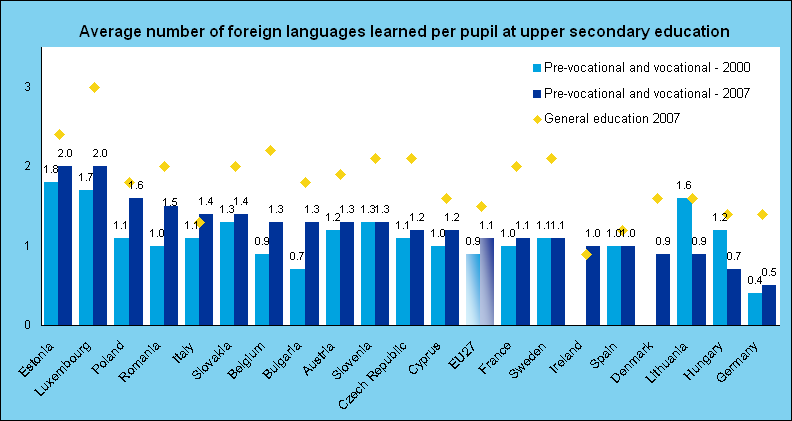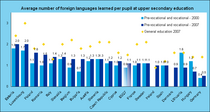Data source: UOE, Eurostat.
Note: Available countries only, including for EU average; see country specific methodological notes at Eurostat.
Mobility and language skills
Helping people to live and work in different countries – international mobility – is a key aim within the European Union, supporting both versatility and employability for citizens.
Language skills are an important factor in increasing mobility, with recent skills audits showing that 20% of companies believe they have lost business because of a lack of language skills.
This chart shows student language learning at upper secondary level. But adults also seek to improve foreign language skills through continuing vocational training.
And with the Europass language passport and the self assessment grid, Cedefop helps people describe their language skills in-an-easy to understand and comparable way.
Key points
- Fewer foreign languages in VET: people studying vocational education at upper-secondary level tend to study fewer foreign languages than those following general stream education.
- But growing over time: between 2000 and 2007 vocational education and training has seen an increase in the average number of foreign languages per pupil in many European countries. Policies in many countries have been geared towards offering VET students increasing amounts of general-type education to complement occupation or sector specific training.
- Eastern Europe leads the way: VET students in Eastern Europe especially tend to learn higher than the average number of foreign languages. It ranges between 1.2 foreign languages per student in the Czech Republic to 2 in Estonia, against a European average of 1.1 and a low of 0.5 in Germany.
Statistics and indicators section
Further country-specific information on the VET systems themselves can be found in Cedefop’s VET in Europe database.
The data come from the UNESCO-OECD-Eurostat (UOE) data collection on education systems and are subject to its methodology.

